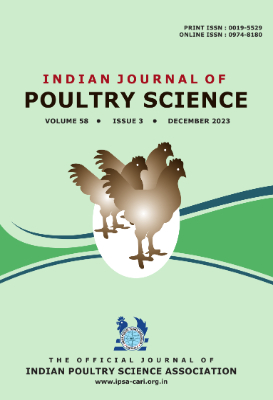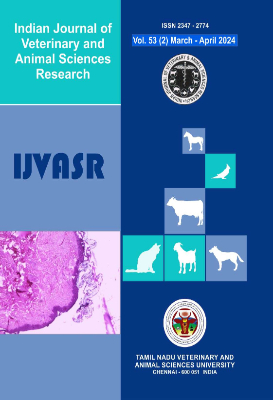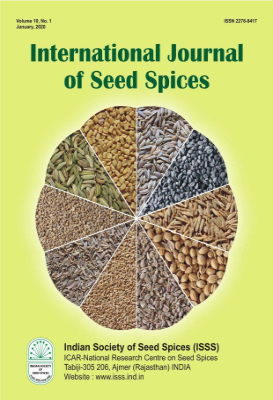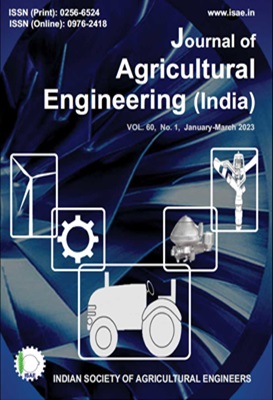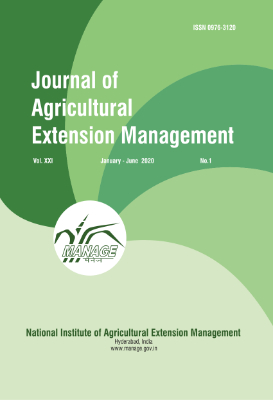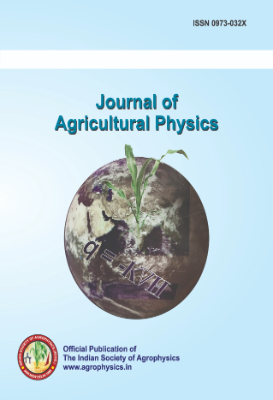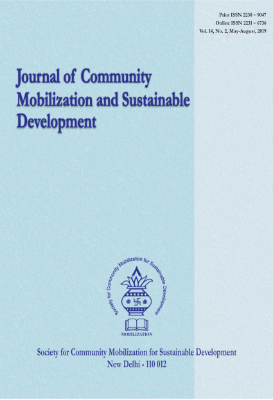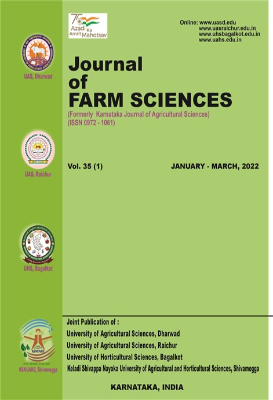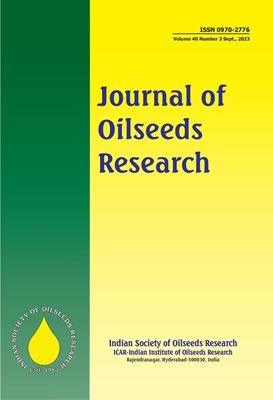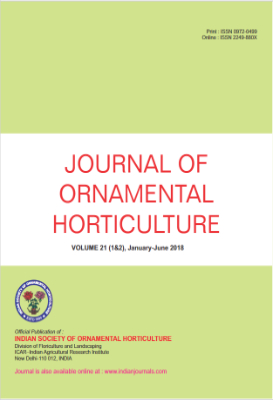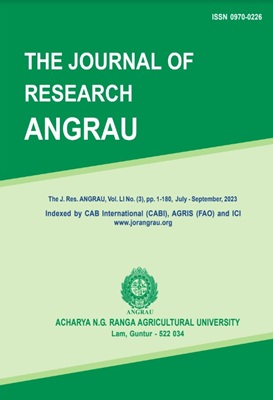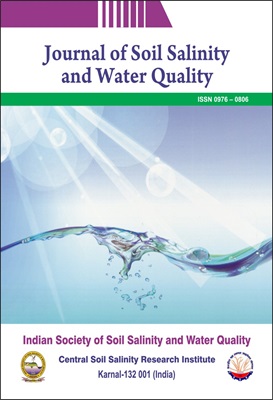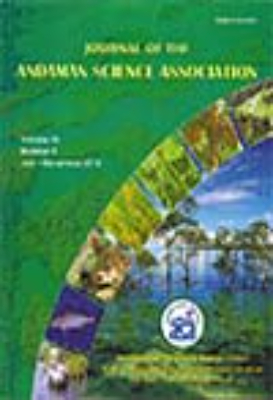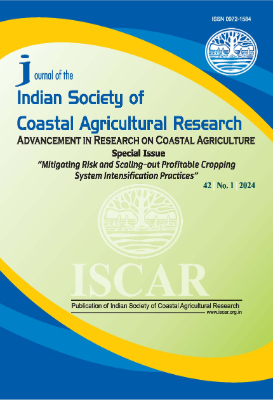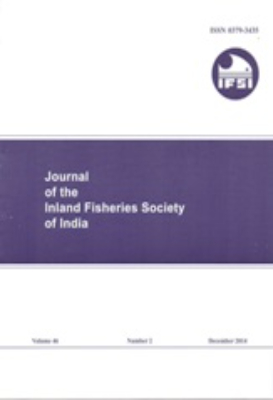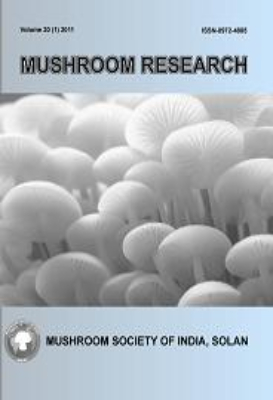E-Resources
Indian Journal of Poultry Science
Established in 1965, Indian Journal of Poultry Science (IJPS), a leading peer-reviewed Indian journal in the field is an official publication of the Indian Poultry Science Association (IPSA), Izatnagar-243 122 (UP). The publication is aimed at providing access to academicians, researchers and industry professionals from across the globe to publish their work on all aspects of poultry science through research papers, short communications and review articles. The journal is published three times in a year as one volume in April, August, and December and circulated to IPSA members free of cost. Till date 58 volumes each with 3 issues have been published.
Indian Journal of Veterinary and Animal Sciences Research
Focus and Scope The Indian Journal of Veterinary and Animal Sciences Research published six times (bi-monthly) in a year, considers original papers for publication on all aspects of Veterinary, Animal, Fisheries, and Food sciences (related to animal products). Peer Review Process In the first phase, the suitability of the manuscript received through the online epubs portal of ICAR will be assessed by the experts on the editorial board of the journal. The qualified manuscripts will be made anonymous and sent to two referees at the national level for review. The manuscripts corrected by referees are sent back to the author for revision. The corrected manuscript will be reviewed by the Editorial Board and technically qualified manuscripts will be accepted and scheduled for publication. Open Access Policy This journal provides immediate open access to its content on the principle that making research freely available to the public supports a greater global exchange of knowledge. Sponsors Tamil Nadu Veterinary and Animal Sciences University, Chennai 600 051 Journal History The Indian Journal of Veterinary and Animal Sciences Research (IJVASR) has been published since 1972, initially under the name 'Cheiron' until 2005, and later as the 'Tamil Nadu Journal of Veterinary and Animal Sciences'. In 2014, the journal adopted its current name to reflect its national relevance and improve visibility. In its current format, IJVASR now publishes review articles, peer-reviewed research articles, short communications, and case reports.
Indian Journal of Veterinary Medicine
Focus and Scope Indian Journal of veterinary Medicine published twice in a year The journal publishes review article(invited),original /applied research, clinical reports short communications on all area of animal health including diagnosis treatment and control. Peer Review Process All articles submitted for publication under goes a peer review process by the expert reviewer of the area. To make the review process more transparent Authors name and affiliation were keep in confidence. Based on the comments the articles are either revised or rejected. The revised article further examined by the editorial board. Journal History This Journal is being published regularly since 1981.
International Journal of Seed Spices
The International Journal of Seed Spices is published by the Indian Society for Seed Spices half yearly basis with the aim to provide an appropriate platform presenting well considered, meaningful, constructively thought provoking, non-political and non-controversial but critically analyzing and synthesizing present and future aspects of research on seed Spices and related commodity reference to our country and rest world. The contributors are expected to highlight various issues of irrigation, management, soil, agronomic practices, precision agriculture, breeding, post harvest, IPM, climate change along with meaningful suggestions for solution, refinement and innovations.
Journal of Agricultural Engineering
The subject matter reflects the full range and interdisciplinary nature of research in engineering and physics for agriculture. Manuscripts describing engineering innovations for field crops, horticulture, livestock and fisheries and those reporting research seeking to understand and model the physical processes underlying agricultural systems are welcome.
Journal of Agricultural Extension Management
Focus and Scope The Journal of Agricultural Extension Management (JAEM) disseminates information on extension systems and practices, extension research, efficient organization of technology transfer and other socio-economic issues concerning agriculture and allied areas. Papers on original research in the field of agricultural extension and allied sectors, covering new developments, concepts and their application in effective extension work are accepted for publication. Peer Review Process All papers submitted to the Journal of Agricultural Extension Management (JAEM) are subject to a masked peer review. The article is sent to one reviewer who is selected based on his or her expertise on the subject, research in the area and experience. The criteria for evaluation of articles in the Journal of Agricultural Extension Management are topicality, clear and logical analysis, sound methodology, fairly good English and contribution to knowledge. The Editor reserves the privilege of editing the manuscript, returning it to the author for revision or rejecting any manuscript as unsuitable in topic, style or form with or without requesting external review. Publication Frequency The journal is published half-yearly in June and December. Publication Ethics and Malpractice Statement The Journal of Agricultural Extension Management (JAEM) is a peer-reviewed journal. The responsibilities of the authors, editors and reviewers involved in publishing this journal are indicated here. All papers submitted to the Journal of Agricultural Extension Management are subject to a masked peer review. JAEM does not levy any charges to authors for submission, processing, or publication of articles in the Journal. Authors submitting an article to the journal must declare that (1) they are authors of the article in the order in which listed; (2) the article is original and represents their contributions and has not been copied or plagiarized in whole or in part from other works; and (3) the article has not been published and has not been submitted for publication elsewhere. In cases of proven research misconduct or plagiarism, the publisher, in collaboration with the editors, will take measures to clarify the situation and amend the article. This includes the publication of a correction, clarification or retraction of the work. Responsibility of Authors Authors should ensure that their work is original. If the authors have used the work of others, this must be appropriately cited or quoted. The responsibility for the accuracy of the information, facts, and citations, lies with the authors of the publication. Each author who submits the manuscript should read the guidelines for submission in the Journal of Agricultural Extension Management. The manuscript must be plagiarism-free. The Corresponding Author should ensure that all co-authors have seen and approved the final version of the paper and have agreed to its submission for publication. Sources of funding for the research reported in the article should be acknowledged at the end of the article. Each article should be accompanied with a declaration by all the authors that (1) they are authors of the article in the order in which listed; (2) the article is original and represents their contributions and has not been copied or plagiarized in whole or in part from other works; and (3) the article has not been published and has not been submitted for publication elsewhere. Authors must also declare that the source of information from other published or unpublished works has been referenced and certify that they are solely responsible for the content of the article and the work included in the article. Authors may be asked to provide the raw data in connection with a paper for editorial review and should be prepared to provide access to such data. Authors should avoid duplication in their submissions i.e. attempting to publish similar manuscripts in more than one journal. Authorship should be limited to those who have made a significant contribution to the conception, design and execution of the study. Responsibility of Editors Manuscripts are evaluated on their topicality, originality of the idea, unique argument or insight; clarity of objectives, sound methodology, clear and logical analysis and depth of discussion, appropriate examples, consistent structure and presentation and contribution to knowledge. JAEM does not consider factors like gender, race, religious beliefs, ethnic origin, citizenship, or political philosophy of the authors. The papers submitted to the journal first will undergo screening for originality in content. If they satisfy this requirement the papers will be further sent to review. Otherwise, the papers will be rejected at the first level. The Editor is solely and independently responsible for deciding which articles should be accepted for publication. The Editor reserves the privilege of editing the manuscript, returning it to the author for revision or rejecting any manuscript as unsuitable in topic, style or form with or without requesting external review. Editors must not disclose any information about a submitted manuscript to anyone other than those involved in the publishing process. Reviewers JAEM maintains confidentiality of the submission. Reviewers remain anonymous to authors. The reviewers do not know the author's identity. The identities of the reviewers are known only to the Editorial Team. Reviewers' comments to the editors are confidential and before passing on to the author are made anonymous. Manuscripts received for review are treated as confidential documents. Reviewers follow a format provided by MANAGE for the review of the articles. A reviewer may inform the Editorial Team about any similarity or overlap between the manuscript under consideration and any other published paper which they know about. Sponsors National Institute of Agricultural Extension Management Journal History The Journal is being published since 2000. From 2000 to 2016 the title was MANAGE Extension Research Review. Subsequently, the title was modified to Journal of Agricultural Extension Management.
Journal of Agricultural Physics
The Journal of Animal Research, which is published half yearly in Print and Electronic form by New Delhi Publisher, accepts exceptionally exciting, novel and timely communications presenting new and original research work for publication keeping in mind the all round welfare of domestic animals including poultry, companion animals, wild animals and experimental models in lab animals. The task of the Journal is to attract the papers on original research articles, short communication and peer reviewed articles from an individuals and organizations of International repute dedicated to animal science, and veterinary science and education. Articles published in the Journal of Animal Research cover a broad range of explorative topics in all subjects of veterinary and animal sciences including animal production, reproduction, growth and Health aspects of domestic animals. This includes veterinary medicine, veterinary surgery, veterinary gynaecology and obstetrics, animal genetics and breeding, animal nutrition, veterinary physiology and biochemistry, veterinary parasitology, veterinary microbiology, veterinary pathology, veterinary pharmacology and toxicology, livestock product and technology, livestock production and management, veterinary public health and hygiene, veterinary anatomy, poultry science, laboratory animals and wild animals. The journal is also focused on research and management of laboratory animals (e.g. rat, mice, rabbit, guinea pig etc.) and wild animals. However, basic types of papers and notes which relate to investigations in a narrow specialized branch of a discipline may not form an appropriate material for this journal. The Journal of Animal Research will publish the reviews, short communication and proceedings of symposia of National and International relevance subject to the final decision of Editor in Chief. National Academy of Agricultural Science (NAAS) Rating 2024: 4.78
Journal of Cereal Research
Focus and Scope The focus of Journal is in cereal research internationally covering all major disciplines of plant breeding, agronomy, pathology, biotechnology, quality and basic sciences etc. Following types of material are considered for publication on meeting the style and requirements of the journal: Articles on original research, not exceeding 4000 words (up to 15 typed pages, including references, Tables, etc. )should be exclusive for the journal. They should present a connected picture of the investigation and should not be split into parts. Complete information of Ph D thesis should preferably be given in 1 article. Short research notes, not more than 1300 words (total 5 typed pages), which deal with (i) research results that are complete but do not warrant comprehensive treatment, (ii) description of new materials or improved techniques or equipment, with supporting data. and (iii) a part of thesis or study. Such notes require no headed sections. Critical research review articles, showing lacunae in research and suggesting possible lines of future work. These are mostly invited from eminent scientists. The research article or note submitted for publication should have a direct bearing on wheat/ barley research or open up new grounds for productive research. Basic type of articles and notes relating to investigation in a narrow specialized branch of wheat may also form an appropriate material for this journal. Peer Review Process An expert in the specific area mandatorily reviews the articles received for publication. The major guidelines for suitability or otherwise of the article are provided to each reviewer. In case of disagreement, the opinion of second reviewer is sought to judge the merit of article. The reviewers are normally given one month time to give their critical comments about the manuscript. Publication Frequency Since 2018, Journal of Cereal Research is published thrice in a year. Open Access Policy This journal provides immediate open access to its content on the principle that making research freely available to the public supports a greater global exchange of knowledge. Sponsors Society for Advancement of Wheat and Barley Research (SAWBAR) Financial Support from Wheat Research and Technology Funds (WRTF) based IIWBR for printing Sources of Support Journal History The JCR (erstwhile WBR / JWR) was started in 2007 and since then biannual issues are published covering different areas of wheat and barley research globally. Since 2018, it is published thrice in a year. In 2019, Journal has been renamed as Journal of Cereal Research(JCR) ISSN : 2582-2675 (erstwhile ISSN: 2249-4065)
Journal of Community Mobilization and Sustainable Development
Focus and Scope The Journal of Community Mobilization and Sustainable Development envisages reorienting the young professionals and researchers for imbibing the values of community participation in research, training and extension efforts. The aim and scope of the journal are: Sharing the relevant experiences and issues related to agriculture and allied fields at the grass root level and global forum to create the necessary academic and development climate. Sensitizing the different stakeholders about the knowledge and innovation management system in pluralistic agri-rural environment. Developing network among the related partners for convergence of their efforts for sustainable academic development of extension education discipline. Peer Review Process The Journal of Community Mobilization and Sustainable Development is a multi-discipline peer reviewed journal and papers are reviewed by one reviewer from the identified panel of reviewers. The reviewers have been identified based on their significant contribution to their discipline. Generally, the reviewing time is 4 weeks. The reviewed papers are referred back to the authors to respond to the suggestions of the reviewers. Open Access Policy This journal provides immediate open access to its content on the principle that making research freely available to the public supports a greater global exchange of knowledge. Sponsors Society for Community Mobilization for Sustainable, Development (MOBILIZATION), New Delhi Journal History Journal of Community Mobilization and Sustainable Development (print ISSN 2230 ? 9047; online ISSN 2231 ? 6736) is published by Society for Community Mobilization for Sustainable Development twice a year since 2006.
Journal of Farm Sciences
Focus and Scope Journal of Farm Sciences (formerly known as Karnataka Journal of Agricultural Sciences) is a quarterly peer reviewed journal devoted to publishing original research / review articles and short communications in fields of Agriculture, Horticulture, Veterinary, Fisheries, Agricultural Engineering, Home Science and allied subjects. Peer Review Process Journal of Farm Sciences is a peer reviewed, open access Journal. It is also recognized by National Academy of Agricultural Science (NAAS). Research papers of Agriculture and its allied sciences including community sciences are being published in the quarterly journal after peer reviewing the articles. Articles will be sent to two referees and based on their recommendation, editorial board take final decision on its publication. It is needless to stress the importance of quality and timely publication. In this context, Editor requests reviewers to offer their valuable technical comments on its suitability or otherwise. If suitable, whether the manuscript is worthy to be published as full length research paper or as a short note in JFS. Requests to return the paper with their comments as soon as possible, preferably within two weeks. The comments may include queries that seek replies from authors to indicate corrections/additions/deletions etc. Open Access Policy This journal provides immediate open access to its content on the principle that making research freely available to the public supports a greater global exchange of knowledge. Sponsors University of Agricultural Sciences, Dharwad University of Agricultural Sciences, Raichur University of Horticultural Sciences, Bagalkot University of Agricultural and Horticultural Sciences, Shivamogga University of Agricultural Sciences Journal History The previous name of the Journal was ''Karnataka Journal of Agricultural Sciences'' (KJAS), which was published from UAS, Dharwad since 1988. Research papers of Agriculture and its allied sciences including community sciences are being published in the quarterly journal after peer reviving the articles. The journal name was changed to Journal of Farm Sciences (JFS) w.e.f. 1.1.2016 obtaining the permission from NAAS, continuing the volume number the previous journal, retaining the present ISSN. Presently JFS is being published as joint publication of four farm Universities of Karnataka state viz., UAS, Dharwad, UAS, Raichur, UAHS, Shivamogga and UHS, Bagalkot. It is a free open access journal since 2007 and uploaded in all above four university websites. The journal is being abstracted /indexed by CAB international and web of science (Clarivate Analytics). The journal is having a NAAS rating of 4.42 since January 2017, with both print and online versions.
Journal of Indian Fisheries Association
Focus and Scope The journal of Inland Fisheries Society of India publishes original research contributions broadly in the field of inland fisheries science. The scope of the journal includes fisheries research on aspects related to inland waters - rivers, reservoirs, floodplain wetlands, estuaries, brackish waters and associated ecosystems. Manuscripts received for consideration will be first screened by the editorial committee for content and overall requirement of the Journal. Those found unsuitable will be returned to the author. Others will be sent to experts in the concerned field for detailed refereeing, with the identity of the author(s) masked. The author(s) will be notified of acceptance, need for revision or rejection of the manuscript. The journal considers article under three broad categories : Research Papers should not exceed 10 pages, including abstract, text (12 pt, double space), tables, figures and references. Short communications should not exceed 4 pages (12 pt, double space), should be a concise information on a particular finding, methodology or comments on recent research publications. Review articles are always asked for from the experts in relevant fields. These may be extended to the maximum of 20 pages, covering critical appraisal of literature on research problems of recent interest. It is mandatory that the author (s) should be the members of the Society. Peer Review Process The journal is a double blind peer reviewed, refereed biannual international journal. The journal welcomes publications of high quality papers. Normally the review system takes 2-3 months time. Sponsors Indian Council of Agricultural Research Journal History The Society regularly brings out a Journal named "The Inland Fisheries Society of India". The 1st Volume was published in December, 1969 and since then made a place among the top fishery journals in the country. The Journal publishes original research works, monographs, invited review articles and books on specialized subjects for exchange and dissemination of information in the country and abroad.
Journal of Oilseeds Research
This scientific and technical journal is dedicated to bring together all persons, organizations and institutions interested in or engaged in the field of oilseeds research, development, oil technology and allied products connected with oilseeds. This would provide the workers a forum for exchange of their views as well as scientific information. The aim of the journal is to promote the dissemination and utility of the scientific information generated in the field of vegetable oil production. Also, the journal periodically publishes the summary of the work carried out in specific fields so that such reviews provide overall idea to the readers interested in a particular field. Direct beneficiaries of the Journal include scientists, technologists, policy makers, industrialists, entrepreneurs interested in undertaking up-scaling of the technologies in the field of oilseeds and allied products. The journal is committed to follow the ethics of scientific publishing and is evolving continuously through adoption of newer monitoring and evaluation schemes. Journal is also committed to up-holding the standard of scientific and professional proficiency as well as research, academic and publication standards.
Journal of Ornamental Horticulture
The Journal of Ornamental Horticulture (ISSN 0972-0499, eISSN 2249-880X) is the peer-reviewed, official publication of the Indian Society of Ornamental Horticulture, (ISOH) New Delhi publishing original research papers/ research notes/ research tools in the field of Ornamental Horticulture and allied fields since 2011. The Indian Society of Ornamental Horticulture, Division of Floriculture & Landscaping, ICAR-Indian Agricultural Research Institute, New Delhi is a registered professional society under the Society Registration Act XXI of 1860 Act 1957 as extended to the Union Territory of Delhi.
Journal of Research ANGRAU
The Journal of Research ANGRAU is the University Publication (quarterly) of Acharya N G Ranga Agricultural University (ANGRAU) and has been published since 1973. This journal is celebrating its 50th volume in the year 2022 and has started only online issue since 2022. The Journal is a double-blind peer-reviewed journal that seeks to encourage research in agriculture, horticulture, agricultural engineering, community science/home science and social sciences (agricultural extension and agricultural economics). The JOR ANGRAU provides a platform to publish original research work in all agricultural and allied sciences. JOR ANGRAU supports research articles which explore innovative experimental approaches and empirical studies. The Journal recognizes works across the above disciplines and therefore especially values meta-disciplinary analyses that will provide a foundation for communication across these academic fields and disciplines. The journal has a NAAS rating of 4.27 (2024) and is a UGC-CARE-approved journal. The Journal is Indexed by CAB International (CABI), AGRIS (FAO) and Indian Citation Index (ICI). Journal has a presence in Google Scholar. The Journal publishes quality research papers in Agriculture and allied sciences after meticulous double-blind peer review process.
Journal of Sugarcane Research
Focus and Scope Journal of Sugarcane Research is a bi-annual periodical of the Society for Sugarcane Research and Development, located at ICAR-Sugarcane Breeding Institute, Coimbatore, Tamil Nadu (India). It publishes original research articles, short research communications and review articles on basic and applied aspects of sugarcane agriculture (sugarcane improvement, genetic resources, genetics, cytogenetics, biotechnology, biochemistry, agronomy, sugarcane physiology, sugarcane soil and chemistry, microbiology, sugarcane entomology, sugarcane pathology, mechanization, economics, etc). All contributions to the journal are reviewed by referees and are selected on the basis of quality and originality of the work. Peer Review Process The objective of JSR is to publish original research articles of high standards. To ensure the quality, all articles in this journal are published after initial scrutiny by the Editorial Board followed by a review by panel of experts (referees) in the concerned discipline. The Editorial Board of JSR consists of one Chief Editor and two Associate Editors. In addition, members of well-known repute (from India and abroad) in the field sugarcane research and development are nominated by the Executive Council (EC) of the SSRD, who will assist in the scrutiny of the articles and publications of the JSR. The Chief Editor will act as Convener of the Editorial Board. The Editorial Board and Referees advise the Chief Editor, who is responsible for the final decision to accept or reject the article. For reviewing one research article, two referees in the concerned discipline are chosen from the JSR reviewer database. The trimmed manuscript containing title and abstract alone are send to the referees to obtain their consent to review the article. Then the whole manuscript (excluding authors name and affiliation) is sent to the reviewers and he/she is asked to evaluate whether the manuscript is: (i) original as to thought and method, (ii) methodologies followed are sound and acceptable, (iii) results are presented unambiguously, (iv) results are discussed with supports and in the light of previous relevant works, (v) conclusion drawn is valid and acceptable, (vi) follows appropriate ethical guidelines, especially as concerns plagiarism (copying text or results from other sources) and self-plagiarism (duplicating substantial parts of authors' own published work without giving the appropriate references), (vii) adds to the knowledge and development of the field of sugarcane agriculture. Language correction is not part of the peer review process, but referees are encouraged to suggest corrections of language and style to the manuscript. In the normal course, the Chief Editor will make final decision to accept or reject the manuscript or ask the author for a revision may be made, on the basis of referees' comments. Should the referees' reports contradict one another or the report of one referee is unnecessarily delayed, the opinion of third referee will be sought. In some cases, the Chief Editor at his discretion may accept or reject the article on the basis of only one referees' report. The Editor's decision will be communicated to the corresponding author along with referees' comments. The time required for the review process is dependent on the response of the referees but the typical time for the first round of the refereeing process is approximately 4 to 5 weeks, with a maximum of 2 months. Simultaneous submissions of the same manuscript to different journals is not accepted by JSR. Manuscript will be rejected outright, on grounds of lack of novelty, insufficient conceptual advance or major technical and/or interpretational problems or the contents outside the scope of the journal. All submitted manuscripts are treated as confidential documents till they are published. The Journal of Sugarcane Research follows ?double blind? reviewing process, in which the identity of the referees remain unknown to the author(s) throughout and following the refereeing process and the identity of the author(s) is unknown to the reviewers. COMPLAINT POLICY: Complaints regarding published material will be accepted within 12 months from the first publication date. In case of any complaint, the authors are required to submit their complaints along with their reasons/valid proof to the editorial office at editor.sbi@icar.gov.in Publication Frequency The journal is published twice a year in June and December respectively. Open Access Policy This journal provides immediate open access to its content on the principle that making research freely available to the public supports a greater global exchange of knowledge. Publication Ethics and Publication Malpractice Statement JSR is committed to ensuring ethics in publication and quality of articles as defined by the Committee of Publication Ethics (COPE). Publication Ethics and Publication Malpractice Statement The following are the standards of expected ethical behavior for all parties involved in publishing Journal of Sugarcane Research, including the editors, authors, and related parties. These guides are based on existing COPE's Best Practice Guidelines for Journal Editors (https://publicationethics.org/resources/guidelines) and Elsevier policies (https://www.elsevier.com/about/policies) Responsibilities of Editors Publication Decisions: The editor of Journal of Sugarcane Research is responsible for deciding which articles submitted to the journal to publish. The editor considers recommendations of corresponding editors, as well as legal requirements regarding libel, copyright infringement, and plagiarism. The editor may consult with the editorial board or reviewers in making decisions. Fair Play: An editor should evaluate manuscripts for their intellectual content without regard to the race, gender, sexual orientation, religious belief, ethnic origin, citizenship, or the political philosophy of the authors. Confidentiality: The editor and any editorial staff must not disclose any information about a manuscript under review to anyone other than the author, reviewers (or potential reviewers), editorial advisers, or the publisher when appropriate. Duties of Reviewers Contribution to Editorial Decisions: Peer review assists the editor in making editorial decisions, and through editorial communications with the author, reviewers may also assist the author in improving the manuscript. Promptness: Any selected referee who feels unqualified to review the research reported in a manuscript, or who knows that its prompt review will be impossible, should excuse themselves from the review process by notifying the editor. Confidentiality: A reviewer receiving a manuscript must treat it as a confidential document and not show it to others or discuss it with them. Standards of Objectivity: Reviewers should submit objective comments that do not include personal criticism of the author, and they should express views clearly with supporting arguments. Disclosure and Conflict of Interest: Privileged information or ideas obtained through peer review must be kept confidential and not used for personal advantage. Reviewers should not consider manuscripts in which they have a conflict of interest resulting in undue influence over their ability to evaluate the manuscript in a professional manner. Directly competitive or collaborative relationships between the reviewer and the author seeking publication in Journal of Sugarcane Research may constitute a conflict of interest, and if the editor determines such a conflict exists, an alternate reviewer will instead evaluate the manuscript. Duties of Authors Reporting Standards: Authors of original research should present an accurate account of the work performed as well as an objective discussion of its significance. An author should accurately describe findings in the manuscript with sufficient detail and references to permit others to replicate the work. Fraudulent or knowingly inaccurate statements constitute unethical and unacceptable behavior, and they may result in disqualification from publication with the editor's determination. Originality and Plagiarism: The authors should ensure that they have prepared entirely original work, and if the authors have used the work and/or words of others that they have appropriately cited or quoted it. Plagiarism takes many forms, from masking another author's work as the author's own, to copying or paraphrasing substantial parts of other works without attribution, to claiming results from research conducted by others. Plagiarism in all its forms constitutes unethical and unacceptable publishing behavior. If the editor determines it to have inadvertently taken place in an article submitted for publication, the author must comprehensively revise any area(s) in question with a failure to do so resulting in rejection of the article. Multiple, Redundant or Concurrent Publication: An author should not in general publish manuscripts describing essentially the same research in more than one journal or primary publication. Submitting the same manuscript to more than one journal concurrently constitutes unethical and unacceptable publishing behavior. If a manuscript under review appears in substantially the same form as an article published elsewhere, it is the editor' prerogative to remove the manuscript from potential publication in Journal of Sugarcane Research Acknowledgement of Sources: Proper acknowledgment of the work of others must always be given. Authors should cite publications that have influenced the nature of the reported work. Information obtained privately, as in conversation, correspondence, or discussion with third parties, must be accompanied by explicit, written permission from the source. Information obtained in the course of confidential services, such as refereeing manuscripts or grant applications, must be accompanied by the explicit written permission of the author of the work involved in these services. Authorship of the Manuscript: Authorship should be limited to those who have made a significant contribution to the conception, design, execution, or interpretation of the material considered for publication. All those who have made significant contributions should be listed as co-authors, and others who have participated in certain substantive aspects of the research project should be acknowledged or listed as contributors. The corresponding author should include only appropriate co-authors with the manuscript, and ensure that all co-authors have seen and approved the final version of the draft and have agreed to its submission for publication. Disclosure and Conflicts of Interest: All authors should disclose in their manuscript any potential conflict of interest (financial or substantive) that might be construed to influence the results or interpretation of their work. They should disclose all sources of financial support for the project. Fundamental Errors in Published Works: If authors discover a significant error or inaccuracy in a manuscript they have published, they must promptly notify the journal editor or publisher and cooperate with the editor to retract or correct the published version of the manuscript. Authorship Authorship An author is an individual who has made substantial intellectual contributions to a scientific investigation. Authors must include their profile, including affiliation and rank, when submitting a manuscript. Submitters should fill-in the metadata related to the manuscript such as authors (In case of multiple authors, each author should be entered separately, using ADD AUTHOR option, one by one. This is very important.), keywords, references etc., A substantial intellectual contribution would require an individual to have significantly participated in one or more of the following activities, i.e., formulating the research problem, designing the study, implementing the study, interpreting and/or analyzing the results, writing and/or reviewing the research paper, and responding to critique. Authorship issue/order should be discussed early in the phase of their work. Authors should have read the manuscript submitted to JSR before print and must be prepared to take responsibility for the data, its interpretations, and conclusions made in it. For multiple authors, the order of names normally should reflect the contributions made by each of them, with the most significant contributor listed as the first author, and so on. All authors must be ready to submit written documentation of their specific contributions Gift, Ghost, or honorary authorship is not acceptable (Ghost/Gift/Guest author is someone who is listed as an author without qualifying for authorship and also someone whose name is included without permission, but meant to acknowledge) (Drawn from various sources) Sponsors Society for Sugarcane Research and Development Journal History Published since June 2011.
Journal of the Andaman Science Association
Focus and Scope Journal provides publications of articles in all areas of Agricultural Sciences, Horticultural Sciences and Forestry, Life Sciences, Environmental Sciences, Genetics, Molecular Biology, Biotechnology, Plant Pathology, Entomology, Biomedical Sciences, Botany and Plant Sciences, Soil Sciences, Zoology, Endocrinology, Toxicology Mycology and Parasitology, Microbiology, Cell Physiology, Environmental Biotechnology, Animal Sciences and Fisheries Sciences. The Journal welcomes the submission of manuscripts that meet the general criteria of significance and scientific excellence. Papers will be published shortly after acceptance. All articles are peer-reviewed. Publication Frequency The journal is published twice a year. Open Access Policy This journal provides immediate open access to its content on the principle that making research freely available to the public supports a greater global exchange of knowledge through Journal/ ICAR-CIARI website. About ASA Andaman and Nicobar Islands which are situated at Latitude 6o- 14o is north and Longitude -92o-94o in east consisting of 572 green emerald Islands, Islets and rocks almost all the Island are oriented in the north south direction like an arc and stretch over a length of about 912 km. Most of the Islands have originated because of volcanic eruption in the sea and few of them originated because of coral reef formation. All the islands together are biological and geological paradise, which are having indigenous biota and geological wonders. To do research in small and fragile area like this we have a number of scientific organization like Zoological Survey of India (ZSI), Botanical Survey of India (BSI), Anthropological Survey of India (ASI), National Institute of Ocean Technology (NIOT), Regional Medical Research Centre of ICMR, Fishery Survey of India (FSI), Department of Ocean Studies and Marine Biology, Department of Disaster Management, Department of Science and Technology, Indian Institute of geomagnetism and Geological Survey of India along with this JNRM (Jawaharlal Nehru Rajkeeya Mahavidyalaya) Department of Environment and Forests, Department of Agriculture, Animal Husbandry and Veterinary Services, Department of Fisheries also conducts research in different fields, however, there is no platform for them to present their research work. Hence a scientific society that called as Andaman Science Association was established in the year 1984. Andaman Science Association is an unique body that provides platform for those associated with the management of tropical and island agriculture, horticulture, fisheries, animal and veterinary sciences. Andaman Science Association was publishing a journal called the Journal of the Andaman Science Association from 1985. It was also conducting national and international symposium at Port Blair. So far we have published 17 volumes with two issues during the period 1985 to 2000. Subsequently there was lull of activities as most of the active members were transferred to mainland. Subsequently the association was revived on 15th December 2012 and remaining volume 18 to 20 with two issues was published. There is great demand of the journal in national and international institutions and is addressing particular niches were of island ecology and island agriculture having a multidisciplinary approach. Focus and Scope The Andaman Science Association focus and scope are; Provide and promote opportunity for contact and fellowship amongst scientists interested / engaged in different scientific pursuits. Publish a journal in English which shall be called ?Journal of the Andaman Science Association? and Bulletins, Reports, Books and Newsletter as decided time to time, for the advancement of the aims of the Association. Hold seminars, symposia, colloquia and provide forum for interaction of different scientific and educational organizations working in these Islands. Discuss inter-disciplinary R & D Programmes relevant to these Islands. Undertake any activity that directly or indirectly serves the cause of the Association. Sponsors ICAR- Central Island Agricultural Research Institute, Port Blair Journal History Andaman Science Association has been publishing the Journal of the Andaman Science Association from 1985. It was also conducting national and international symposium at Port Blair. So far we have published 17 volumes with two issues during the period 1985 to 2000. Subsequently there was lull of activities as most of the active members were transferred to mainland. Subsequently the association was revived on 15th December 2012 and remaining volume 18 to 20 with two issues were published.
Journal of the Indian Society of Agricultural Statistics
Focus and Scope The Journal devoted to the publication of original research papers on all aspects of Statistics and Computer Applications preferably with innovative applications in Agricultural Sciences or that have a potential application in Agricultural Sciences. The review articles of the topics of current interest are welcome. The Journal also accepts books, monographs and periodicals for review. Special issues on thematic areas of both national and international importance are also brought out. Peer Review Process Journal of the Indian Society of Agricultural Statistics is peer reviewed journal. The paper is assigned a manuscript number immediately on manuscript submission. An associate editor is then assigned for handling the review process of the paper. Normally the first review of the paper is sent to the authors within 18-20 weeks of its submission. The editorial process is expected to complete within 36 weeks of its submission. Open Access Policy This journal provides immediate open access to its content on the principle that making research freely available to the public supports a greater global exchange of knowledge. Journal History The first volume of the Journal was released in 1948.
Journal of the Indian Society of Coastal Agricultural Research
Focus and Scope The Journal of the Indian Society of Coastal Agricultural Research (JISCAR) considers original full length papers, short communications and review articles in English only based on the results of research in agriculture and allied disciplines (horticulture, forestry, aquaculture, animal husbandry, soils, water management, agricultural extension, agricultural economics, ecology, climate, policy issues, etc.) pertaining to the agricultural production and ecology of the coastal region for publication. The review articles are received only by invitation. Besides the journal also publishes book reviews relevant to the coastal ecosystem. Peer Review Process The articles received online are first reviewed by the Chief Editor and/or Managing Editor including members of the Editorial Board to assess whether the articles can be considered for publication. Generally, articles are thereafter sent to two reviewers who are specialist in that area of research, out of the panel prepared. Usually two weeks time is given to the reviewers. The reviewers are required to submit a report regarding the suitability of the article along with the comments. If the reviewers do not respond in time then they are sent reminders. In the event that one of the reviewers does not respond even after being given reminder then the Editor in consultation with the Editorial Board takes suitable action based on the comments of one reviewer. Each article recommended or otherwise is also reviewed on the light of the comments received and recommended articles are suitably edited by a member of the Editorial Board. The comments of the reviewer and Editorial Board are sent online to the author for making the revision and re-submission. The accepted articles are then thoroughly checked for English language, uniformity and any ambiguity before publication. Best efforts are made to complete the review process at the earliest and confer acceptance to the authors within two months. Open Access Policy This journal provides immediate open access to its content on the principle that making research freely available to the public supports a greater global exchange of knowledge. Submission Policy Submission of the manuscripts is accepted only through online system. Authors should submit the manuscript (complete in all respect) online using the link http://epubs.icar.org.in/ejournal/index.php/JISCAR. Since the manuscripts are blind peer reviewed, author should ensure to upload the manuscript without names of the authors and their affiliation. The author details should be uploaded as a separate file during submission of the manuscript. The society does not charge any fees for publication and no reprints are supplied. JISCAR supports open access and the journal articles are freely available for download to the users. Policy of Assured Publication Submission of an article does not imply that it will be assured publication in the journal. The articles must fulfill all the publication guidelines and policies of the Journal. Articles that do not fall within the scope of the Journal, poorly written articles, etc. will be rejected at the first stance. All the articles that are submitted are subjected to peer review process and based on the recommendations of the reviewer the editorial board takes suitable action to accept, recast or reject the submission. Policy to Check Plagiarism Authors using any text, figures, etc., from other sources must ensure that there is no violation of copyright norms/rules. All sources must be cited at the point of use, in addition, permission is required from the competent authority of the original publications of the use of data in the form of tables or illustrations, and the same communicated along with the manuscript to JISCAR editorial board. Authors are required to declare at the time of online submission that the manuscript is an original work of the author. Manuscripts if found to be plagiarized from other published works, whether published or unpublished will be rejected and suitable action will be taken as per the guidelines on publication ethics. Ethics Policy Authors must take care to comply with the requirements of publication ethics in preparation of their manuscript. Article or its parts submitted to this journal for publication should not have been published or submitted for publication elsewhere. At the time of submission, authors must declare that the article is original; has been seen by all the authors, and all are satisfied with its form and content; the sequence of names of authors is as per their relative contribution in the study and due credit has been given to all authors who have made notable contribution; it is approved by the appropriate authorities from the place where the work was carried out; the submission has not been previously published (except in the form of an abstract or in as a thesis), nor is it before another journal for consideration (or an explanation has been provided in Comments to the Editor); the instructions in ensuring a blind review have been followed. The manuscript to be uploaded must not contain the author names and their affiliation. The falsification, manipulation, fabrication of data amounts to violation of ethics. If the author wants to use certain parts such as figures, illustrations, text, etc. from already published material, then the permission from the holder of the copyright must be sought and appropriate document should be submitted at the time of manuscript submission otherwise it will be assumed that they are the original works of the author(s). The publisher by any means shall not be responsible for any conflict of interest, violation of rules or norms or any compensation claim. Appropriate action will be take for violation of the ethics policy per the guidelines on publication ethics. Author Certificate Download Author Certificate Manuscript Template Authors can use the template in word format for the preparation of the manuscript. However, if they wish not to use the template then follow the instructions given in the Author Guidelines. Author Guidelines and Article template can be downloaded from https://www.iscar.org.in/journal Sponsors The Society is highly indebted to Indian Council of Agricultural Research (ICAR), New Delhi for providing necessary financial assistances for publication of the Journal. Indian Council of Agricultural Research Article Processing Charges The Indian Society of Coastal Agricultural Research does not levy any charge for article processing. Journal History Since 1983, the Society has been publishing two issues of The Journal of the Indian Society of Coastal Agricultural Research in a year, first issue in June and second issue in December. So far forty one (41) volumes of the Journal have been published. From 2018 onwards, the Journal is also being published online.
Journal of the Indian Society of Soil Science
The Journal of the Indian Society of Soil Science publishes papers concerned with the advancement of agriculture throughout the world. It publishes original scientific work related to strategic and applied studies in all aspects of agricultural science and exploited species, as well as reviews of scientific topics of current agricultural relevance. Specific topics of interest include (but are not confined to): soil genesis and classification; soil properties and processes in relation to soil physics, soil chemistry, soil biology, soil mineralogy; soil evaluation and land use planning, soil fertility and plant nutrition, crop production; soil engineering and technology, soil degradation, control, remediation and reclamation; soil and environment, environmental impacts of agriculture and forestry, impacts of climate change. The journal also publishes book reviews.
Journal of the Inland Fisheries Society of India
Focus and Scope The journal of Inland Fisheries Society of India publishes original research contributions broadly in the field of inland fisheries science. The scope of the journal includes fisheries research on aspects related to inland waters - rivers, reservoirs, floodplain wetlands, estuaries, brackish waters and associated ecosystems. Manuscripts received for consideration will be first screened by the editorial committee for content and overall requirement of the Journal. Those found unsuitable will be returned to the author. Others will be sent to experts in the concerned field for detailed refereeing, with the identity of the author(s) masked. The author(s) will be notified of acceptance, need for revision or rejection of the manuscript. The journal considers article under three broad categories : Research Papers should not exceed 10 pages, including abstract, text (12 pt, double space), tables, figures and references. Short communications should not exceed 4 pages (12 pt, double space), should be a concise information on a particular finding, methodology or comments on recent research publications. Review articles are always asked for from the experts in relevant fields. These may be extended to the maximum of 20 pages, covering critical appraisal of literature on research problems of recent interest. It is mandatory that the author (s) should be the members of the Society. Peer Review Process The journal is a double blind peer reviewed, refereed biannual international journal. The journal welcomes publications of high quality papers. Normally the review system takes 2-3 months time. Sponsors Indian Council of Agricultural Research Journal History The Society regularly brings out a Journal named "The Inland Fisheries Society of India". The 1st Volume was published in December, 1969 and since then made a place among the top fishery journals in the country. The Journal publishes original research works, monographs, invited review articles and books on specialized subjects for exchange and dissemination of information in the country and abroad.
Mahatma Gandhi’s Vision of Agriculture: Achievements of ICAR
The country is celebrating the 150th birth anniversary of the Father of the Nation, Mahatma
Gandhi. He led freedom struggle against British empire, which transformed him into a global
leader of masses, disadvantageous and poor people. He has shown the way of social, economic
and political transformation with small steps to serve the rural poor. Non-violence, truthfulness,
democratic institutions, village industry and people-centric approach were his main principles
and teachings for the people. He had led several movements to pursue the cause of Indian
farmers, including famous protest of Champaran in 1917, Dandi March in 1930 and Quit India
Movement in 1942. These movements motivated the farmers and rural workers to join the
freedom struggle.
Mahatma Gandhi firmly believed that prosperity of agriculture and farmers should pave the
way for economic prosperity of the country. This belief has been reaffirmed in the agricultural
development process followed in India and other developing countries. Evidences are now
available indicating that agricultural growth has significant impacts on reduction of poverty and
promotion of social and economic equity. The pandemic of COVID-19 has further established
that agriculture is a strong pillar to absorb economic shocks and build resilience to economic
growth.
The Indian Council of Agricultural Research (ICAR) has been at the forefront to propel
agricultural development through development and dissemination of technology, building
human capital and establishing the rural centres to serve the farmers. The Council has
developed partnerships with the organizations serving farmers and rural people. One of the
important components of ICAR strategy is increasing agricultural productivity in harmony
with nature. The needs of unprivileged farmers, marginal production environments, and rural
youth have been accorded high priority in research programs of the Council. Similarly, gender
mainstreaming, outscaling of farmers? innovations, farmers? participatory approach, and
institutional change for higher efficiency has been corner stones of research approach of ICAR.
In other words, the Council has followed the principles of Mahatma Gandhi to make Indian
agriculture prosperous, empower farmers, and strengthen village institutions. The efforts made
by the Krishi Vigyan Kendras to develop skills of rural women and small farmers, and to
provide services at the doorstep of farmers have contributed to the Gandhian vision.
This publication documents the major contributions of ICAR to promote sustainable
development, technological empowerment of people in inaccessible areas, enhance value of
farm produce, and promote rural livelihood options. Conservation of biodiversity, soil and
water, yield improvement of millets in hill areas, improvement of indigenous cattle, goat
development, support for fishermen, and food processing options for households are some of
the notable examples.
I compliment ICAR for bringing out this publication that shall be useful for policy makers and
public agencies to take the task of agriculture and rural development on the Gandhian way. This
is the need of the hour when there is weakening of the values of rural communities and rising
pressure on natural resources.
Mushroom Research
Focus and Scope Mushroom Research, the official publication of the Mushroom Society of India is a bi-annual journal. It publishes full papers and short communications reporting original research, basic and applied, which contribute significantly to the knowledge of the mushroom science and industry. Mini-reviews (with prior consent or invitation only) and articles of practical/technical importance will be published. News and views, and book reviews will also be considered. The author (s) should be the members of the Society. Peer Review Process The journal Mushroom Research is a double blind peer reviewed, refereed biannual international journal that provides rapid publication of articles in all areas related to mushroom sciences. The journal welcomes publications of high quality papers. Normally this double blind review system takes 2-3 months. Publication Frequency Bianually in July and December. Open Access Policy This journal provides immediate open access to its content on the principle that making research freely available to the public supports a greater global exchange of knowledge. SJIF Impact Factor 2014 - 3.213 2015 - 6.198 2016 - 6.474 2017 - 6.668 2020 - 7.291 Publication Ethics and Publication Malpractice Statement The Mushroom Research Journal is an official publication of Mushroom Society of India and it is expected that all the editors, authors and reviewers of the Mushroom Research Journal agree upon standards of proper ethical behavior and accept the responsibility for fulfilling the following duties and responsibilities Duties of Editors Transparency Editors evaluate submitted manuscripts exclusively on the basis of their academic merit and its relevance to the journal?s scope, without regard to the authors? race, gender, sexual orientation, ethnic origin, citizenship, religious belief, political philosophy or institutional affiliation. The Editor-in-Chief has full authority over the entire editorial content of the journal and the timing of publication of that content. Confidentiality Editors and editorial staff will not disclose any information about a submitted manuscript to anyone other than the corresponding author, reviewers, potential reviewers, other editorial advisers, and the publisher, as appropriate. Disclosure and conflicts of interest Editors and editorial board members will not use unpublished information disclosed in a submitted manuscript for their own research purposes without the authors? explicit written consent. Privileged information or ideas obtained by editors as a result of handling the manuscript will be kept confidential and not used for their personal advantage. Editors will recuse themselves from considering manuscripts in which they have conflicts of interest resulting from competitive, collaborative, or other relationships/connections with any of the authors, companies or institutions connected to the papers; instead, they will ask another member of the editorial board to handle the manuscript. Publication decisions The editors ensure that all submitted manuscripts being considered for publication undergo peer-review by at least two reviewers who are expert in the field. The Editor-in-Chief is responsible for deciding which of the manuscripts submitted to the journal will be published, based on the validation of the work in question, its importance to researchers and readers, the reviewers? comments, and such legal requirements as are currently in force regarding libel, copyright infringement and plagiarism. The Editor-in-Chief may confer with other editors or reviewers in making this decision. Involvement and cooperation in investigations Editors (in conjunction with the publisher and/or society) will take responsive measures when ethical concerns are raised with regard to a submitted manuscript or published paper. Every reported act of unethical publishing behaviour will be looked into, even if it is discovered years after publication. If, on investigation, the ethical concern is well-founded, a correction, retraction, expression of concern or other note as may be relevant, will be published in the journal. Duties of Reviewers Contribution to editorial decisions Peer review assists editors in making editorial decisions and, through editorial communications with authors, may assist authors in improving their manuscripts. Peer review is an essential component of formal scholarly communication and lies at the heart of scientific endeavour. Promptness Any invited referee who feels unqualified to review the research reported in a manuscript or knows that its prompt review will be impossible should immediately notify the editors and decline the invitation to review so that alternative reviewers can be contacted. Confidentiality Any manuscripts received for review are confidential documents and must be treated as such; they must not be shown to or discussed with others except if authorized by the Editor-in-Chief (who would only do so under exceptional and specific circumstances). This applies also to invited reviewers who decline the review invitation. Standards of objectivity Reviews should be conducted objectively and observations formulated clearly with supporting arguments so that authors can use them for improving the manuscript. Personal criticism of the authors is inappropriate. Acknowledgement of sources Reviewers should identify relevant published work that has not been cited by the authors. Any statement that is an observation, derivation or argument that has been reported in previous publications should be accompanied by the relevant citation. A reviewer should also notify the editors of any substantial similarity or overlap between the manuscript under consideration and any other manuscript (published or unpublished) of which they have personal knowledge. Disclosure and conflicts of interest Any invited referee who has conflicts of interest resulting from competitive, collaborative, or other relationships or connections with any of the authors, companies or institutions connected to the manuscript and the work described therein should immediately notify the editors to declare their conflicts of interest and decline the invitation to review so that alternative reviewers can be contacted. Unpublished material disclosed in a submitted manuscript must not be used in a reviewer?s own research without the express written consent of the authors. Privileged information or ideas obtained through peer review must be kept confidential and not used for the reviewer?s personal advantage. This applies also to invited reviewers who decline the review invitation. Duties of Authors Reporting standards Authors of original research should present an accurate account of the work performed and the results, followed by an objective discussion of the significance of the work. The manuscript should contain sufficient detail and references to permit others to replicate the work. Review articles should be accurate, objective and comprehensive, while editorial 'opinion' or perspective pieces should be clearly identified as such. Fraudulent or knowingly inaccurate statements constitute unethical behaviour and are unacceptable. Data access and retention Authors may be asked to provide the raw data of their study together with the manuscript for editorial review and should be prepared to make the data publicly available if practicable. In any event, authors should ensure accessibility of such data to other competent professionals for at least 10 years after publication (preferably via an institutional or subject-based data repository or other data centre), provided that the confidentiality of the participants can be protected and legal rights concerning proprietary data do not preclude their release. Originality and plagiarism Authors should ensure that they have written and submit only entirely original works, and if they have used the work and/or words of others, that this has been appropriately cited. Publications that have been influential in determining the nature of the work reported in the manuscript should also be cited. Plagiarism takes many forms, from "passing off" another's paper as the author's own, to copying or paraphrasing substantial parts of another's paper (without attribution), to claiming results from research conducted by others. Plagiarism in all its forms constitutes unethical publishing behaviour and is unacceptable. Multiple, duplicate, redundant or concurrent submission/publication Papers describing essentially the same research should not be published in more than one journal or primary publication. Hence, authors should not submit for consideration a manuscript that has already been published in another journal. Submission of a manuscript concurrently to more than one journal is unethical publishing behaviour and unacceptable. Authorship of the manuscript Only persons who meet these authorship criteria should be listed as authors in the manuscript as they must be able to take public responsibility for the content: (i) made significant contributions to the conception, design, execution, data acquisition, or analysis/interpretation of the study; and (ii) drafted the manuscript or revised it critically for important intellectual content; and (iii) have seen and approved the final version of the paper and agreed to its submission for publication. All persons who made substantial contributions to the work reported in the manuscript (such as technical help, writing and editing assistance, general support) but who do not meet the criteria for authorship must not be listed as an author, but should be acknowledged in the "Acknowledgements" section after their written permission to be named as been obtained. The corresponding author should ensure that all appropriate coauthors (according to the above definition) and no inappropriate coauthors are included in the author list and verify that all coauthors have seen and approved the final version of the manuscript and agreed to its submission for publication. Disclosure and conflicts of interest Authors should?at the earliest stage possible (generally by submitting a disclosure form at the time of submission and including a statement in the manuscript)?disclose any conflicts of interest that might be construed to influence the results or their interpretation in the manuscript. Examples of potential conflicts of interest that should be disclosed include financial ones such as honoraria, educational grants or other funding, participation in speakers? bureaus, membership, employment, consultancies, stock ownership, or other equity interest, and paid expert testimony or patent-licensing arrangements, as well as non-financial ones such as personal or professional relationships, affiliations, knowledge or beliefs in the subject matter or materials discussed in the manuscript. All sources of financial support for the work should be disclosed (including the grant number or other reference number if any). Acknowledgement of sources Authors should ensure that they have properly acknowledged the work of others, and should also cite publications that have been influential in determining the nature of the reported work. Information obtained privately (from conversation, correspondence or discussion with third parties) must not be used or reported without explicit, written permission from the source. Authors should not use information obtained in the course of providing confidential services, such as refereeing manuscripts or grant applications, unless they have obtained the explicit written permission of the author(s) of the work involved in these services. Hazards and human or animal subjects If the work involves chemicals, procedures or equipment that have any unusual hazards inherent in their use, the authors must clearly identify these in the manuscript. If the work involves the use of animals or human participants, the authors should ensure that all procedures were performed in compliance with relevant laws and institutional guidelines and that the appropriate institutional committee(s) has approved them; the manuscript should contain a statement to this effect. Authors should also include a statement in the manuscript that informed consent was obtained for experimentation with human participants. The privacy rights of human participants must always be observed. Peer review Authors are obliged to participate in the peer review process and cooperate fully by responding promptly to editors? requests for raw data, clarifications, and proof of ethics approval, patient consents and copyright permissions. In the case of a first decision of "revisions necessary", authors should respond to the reviewers? comments systematically, point by point, and in a timely manner, revising and re-submitting their manuscript to the journal by the deadline given. Fundamental errors in published works When authors discover significant errors or inaccuracies in their own published work, it is their obligation to promptly notify the journal?s editors or publisher and cooperate with them to either correct the paper in the form of an erratum or to retract the paper. If the editors or publisher learns from a third party that a published work contains a significant error or inaccuracy, then it is the authors? obligation to promptly correct or retract the paper or provide evidence to the journal editors of the correctness of the paper. Duties of the Publisher Handling of unethical publishing behaviour In cases of alleged or proven scientific misconduct, fraudulent publication or plagiarism, the publisher, in close collaboration with the editors, will take all appropriate measures to clarify the situation and to amend the article in question. This includes the prompt publication of an erratum, clarification or, in the most severe case, the retraction of the affected work. The publisher, together with the editors, shall take reasonable steps to identify and prevent the publication of papers where research misconduct has occurred, and under no circumstances encourage such misconduct or knowingly allow such misconduct to take place. Access to journal content The publisher is committed to the permanent availability and preservation of scholarly research and ensures accessibility by partnering with organizations and maintaining our own digital archive. Mushroom Society of India allows free access to Mushroom Research journal on the website http://epubs.icar.org.in/ejournal/index.php/index/loginsource=%2Fejournal%2Findex.php%2Findex%2Fuser after registering to the website. Sponsors Indian Council of Agricultural Research Journal History Mushroom Society of India (MSI) was established in August 1990 at headquarter NCMRT-Solan (Now Directorate of Mushroom Research) with 10 founder members and its membership has since then crossed 550 life members, 36 annual members and 49 library members throughout the world. The society registered under society registration Act 1860 vide No.60/91 dated 21.05.1991 at Solan (HP). Since its inception, MSI has organized two International Conferences, two National symposium. Presently MSI has 550 life members, 36 annual members and 49 library members throughout the world. One of the major objectives of the MSI was to bring out a journal to cater to the needs of the researchers and growers. It has fulfilled its commitment and the first issue of the Mushroom Research was in researchers and mushroom growers hands. It has been possible with the help of the members, executive council, editorial staff and especially the contributors to the back volume issue. Till date 32 volumes, each having issues have been published.

